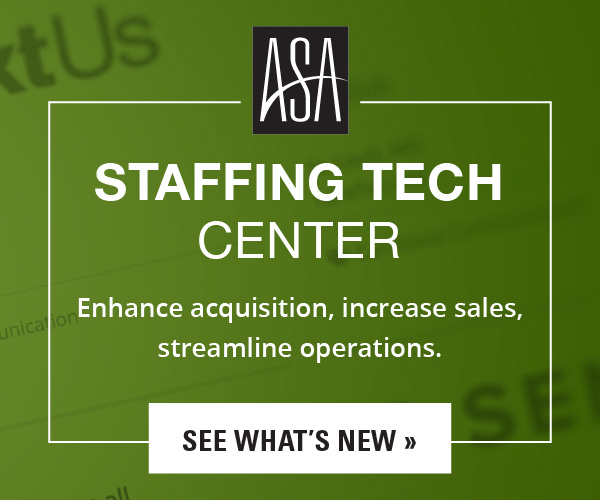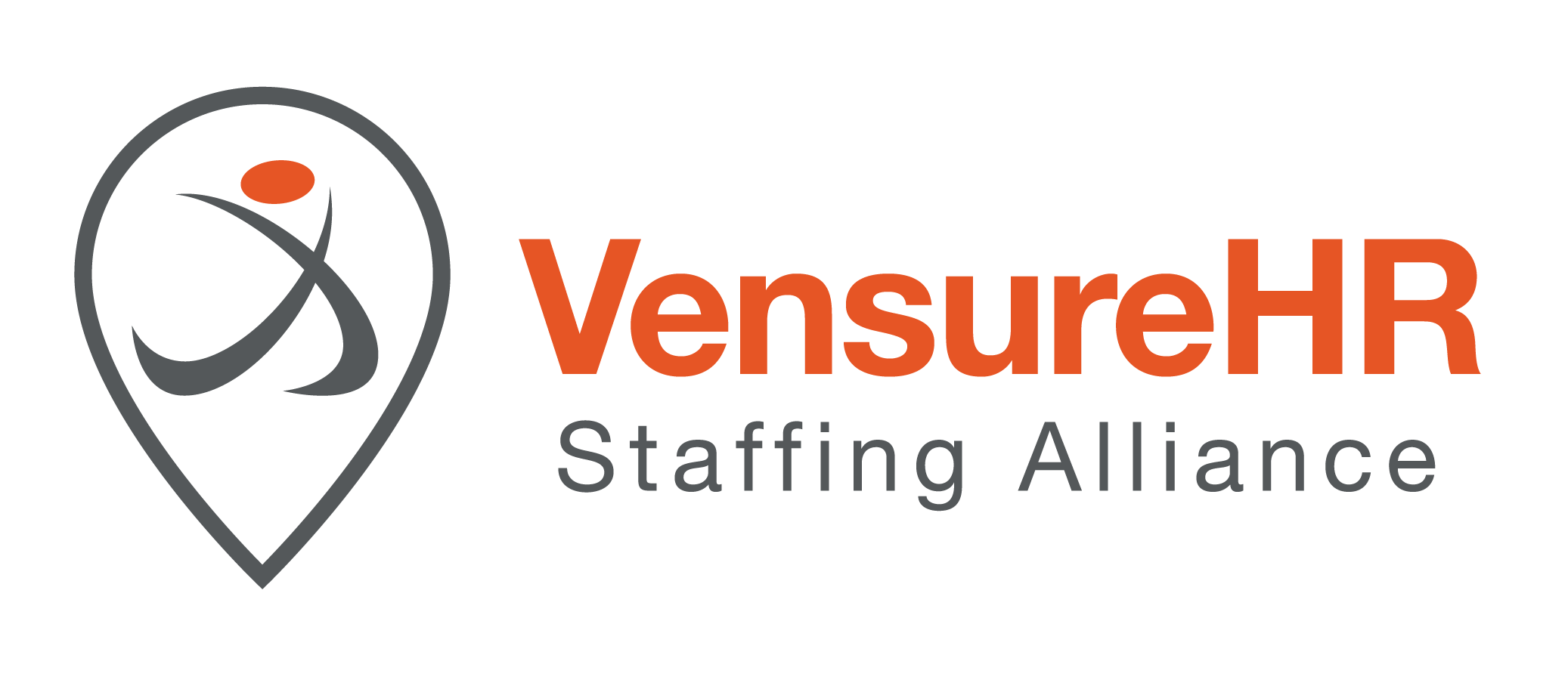April 19, 2024
Elevate Your Voice—Be a Presenter at Staffing World in 2024
The American Staffing Association’s call for subject matter experts is open now. Do you have insights that are essential to the staffing, recruiting, or workforce solutions industry that you’d like to share with the ASA community in 2024?
Submit your proposal today for your chance to speak at Staffing World®, the ASA annual convention and expo, Oct. 22–24 at the Gaylord Opryland Resort and Convention Center in Nashville, TN.
Spots are available in the Knowledge Hub at Staffing World—Knowledge Hub Tech Talks are 10-minute talks on technology topics, and Knowledge Hub Speed Talks are 10-minute talks covering broader industry topics. For more information and to start your submission, visit americanstaffing.net/presenters. Proposals are due May 31.
WilliamCharles Search Group Merges With Reflex Staffing Solutions
CEI Acquires Fourth Dimension
Government Hiring Spree Propping Up the U.S. Job Market
Contracted Physicians, Assistants at Ascension St. John Go on Strike
One in Three Hiring Managers Knowingly Ask Illegal Questions During the Hiring Process
ASA for You
The ASA board of directors and staff welcome the following new members, which joined during the week ending April 14.
Elabram Systems Sdn Bhd
Putrajya, Malaysia
Emerald Staffing Inc.
Lake Oswego, OR
Ideal Talent Marketplace
Minneapolis, MN
Return to Headlines
Legal Watch
How to Avoid a PR Nightmare: Lessons Learned From Cloudflare’s Viral Firing of Tech Worker
Lexology (04/17/24) Dos Santos, Joyce M.
In response to the trend of Generation Z employees recording and sharing their terminations on social media platforms, employers might be tempted to implement policies that prohibit employees from recording workplace conversations. This may get them in hot water with the U.S. National Labor Relations Board, which has held that, in certain circumstances, an employee recording in the workplace can be legally protected activity under Section 7 of the National Labor Relations Act. Thus, for most employers, policies prohibiting recording should apply only to information that is not protected under Section 7, such as information about customers, vendors, suppliers, or corporate trade secrets.
Employers seeking to steer clear of “viral” controversies should avoid surprises with timely and documented performance discussions. Ideally, employers should terminate employees in private and preferably in person. Employers should keep the communication brief and nonargumentative and should protect the company’s confidential information. Employers also should seek legal advice to assess the risk of terminating an employee.
Return to Headlines
|
Read the full story→
Legal Watch
Department of Labor Releases 2023 Injury, Illness Data
U.S. Department of Labor (04/18/24)
The U.S. Department of Labor’s Occupational Safety and Health Administration has released 2023 injury and illness data collected under the agency’s new Improve Tracking of Workplace Injuries and Illnesses regulation published in July 2023. The data include specific information submitted by more than 375,000 establishments on OSHA Form 300A Summary of Work-Related Injuries and Illnesses. It also includes individual injuries and illnesses for employers with 100 or more employees in select high-hazard industries.
In addition, OSHA has posted partial data from more than 850,000 OSHA Form 300 Log of Work-Related Injuries and Illnesses and Form 301 Injury and Illness Incident Report records. Providing access to injury and illness data will help identify unsafe conditions and workplace hazards that may cause occupational injuries and illnesses.
Return to Headlines
|
Read the full story→
Legal Watch
EEOC Mid-Year Lawsuit Filing Update for Fiscal Year 2024
Lexology (04/15/24) Karasik, Alex W.
During the first six months of fiscal year 2024, the U.S. Equal Employment Opportunity Commission filed 14 new lawsuits, down from 29 during the same period in FY 2023. EEOC’s Atlanta and Philadelphia District Offices filed three lawsuits each, followed by Houston, Indianapolis, and New York with two each, and Dallas and Chicago with one each.
Of the 14 filings, 12, or 87%, alleged violations of Title VII of the Civil Rights Act of 1964, up from 59% of filings in FY 2023. Three lawsuits, or 21%, alleged violations of the Americans With Disabilities Act, down from 31% in FY 2023. One lawsuit included an Age Discrimination in Employment Act claim, and another included a Pregnancy Discrimination Act claim. In FY 2023, EEOC recovered $665 million in monetary relief for more than 22,000 workers, up close to 30% from FY 2022.
Return to Headlines
|
Read the full story→
Legal Watch
FTC to Consider Issuing Proposed Final Rule Regarding Noncompetes
Lexology (04/16/24) Milligan, Robert
The U.S. Federal Trade Commission’s virtual open meeting on April 23 will include a vote on whether to issue a proposed final rule that would ban most employers from using noncompete clauses. The meeting will begin with a vote on whether to authorize public disclosure of the proposed final rule that is under consideration.
If the vote passes, the Office of Policy Planning will make a staff presentation on the rule, which would be followed by a vote on whether to issue the final rule. FTC received more than 26,000 public comments on the proposed rule issued in January 2023.
Return to Headlines
|
Read the full story→
Legal Watch
Second Circuit Ruling Could ‘Impact’ Discrimination Claims Brought by Remote Workers Under New York State Human Rights Law
Lexology (04/17/24) Gigante, Evandro C.; Fant, Laura; Thorton, Chad
In King v. Aramark Services Inc., a panel of the U.S. Court of Appeals for the Second Circuit affirmed the dismissal of claims under the New York State Human Rights Law. It held that under the state’s “impact test,” occasional remote work by an employee within the state is insufficient to render New York “the place where the impact of the alleged discriminatory conduct is felt” for purposes of coverage under the NYSHRL.
The Second Circuit did allow the plaintiff’s hostile work environment claim under Title VII of the Civil Rights Act of 1964 to proceed. Employers should take note that the ruling emphasizes the Second Circuit’s position that “the continuing violation doctrine allows a Title VII plaintiff to rely on a discrete act to render a hostile environment claim timely if the plaintiff establishes that the discrete act was part of the ongoing, discriminatory practice that created a hostile work environment.” However, the Second Circuit added that “an unrelated discrete act, different in kind from the conduct giving rise to the hostile environment, does not trigger the continuing violation doctrine.”
Return to Headlines
|
Read the full story→
Legal Watch
Fifth Circuit Affirms Legal Recruiter Misappropriated Trade Secrets and Violated Restrictive Covenants
American Staffing Association (04/19/24) Soronen, Lisa
The U.S. Court of Appeals for the Fifth Circuit recently upheld an adverse decision against a legal recruiter, finding that he misappropriated trade secrets and violated restrictive covenants after leaving his former employer and using candidate and client information to place attorneys through his new employer. The appeals court affirmed the lower (district) court’s decision that awarded over $6 million in damages and attorney’s fees to the recruiter’s former employer.
The legal recruiter had signed noncompete and nonsolicitation agreements with his former employer. After resigning to work for a competitor, he utilized and revealed to his new employer attorney candidate names, their clients, worth of their practices, their language skills, their goals in switching firms, and their law school records, all of which the appeals court held were trade secrets. The Fifth Circuit stated that this information “was not generally known and not readily ascertainable” because the legal recruiter acquired this information only because of his employment with his former employer.
The legal recruiter also signed an agreement that he would not work with any candidates or clients he had “contact with, knowledge of, or access to” during the 12 months preceding termination of his employment. Florida law allows restrictive covenants as long as they involve a “legitimate business interest.” By Florida statute, trade secrets are a legitimate business interest. For this reason, the district court found part of the restrictive covenant lawful. Interestingly, the district court used the “blue pencil” rule to strike the “knowledge of, or access to” language from the restrictive covenant. This means, according to the district court, the legal recruiter could only be restricted for 12 months from working with candidates or clients he had contact with through his prior employer. The Fifth Circuit did not address this finding in its brief opinion.
This case is of interest to staffing firms because the type of trade secrets at issue are particularly germane to staffing firms. Regarding restrictive covenants, every state’s law is different, and not all state courts will fix an overly broad restrictive covenant using the blue pencil doctrine. Staffing firms contemplating using restrictive covenants therefore should seek the advice of knowledgeable legal counsel.
To read this case, see Counsel Holdings v. Jowers, No. 22-50936, 2024 WL 1374845 (Fifth Cir. April 1, 2024) and MWK Recruiting v. Jowers, No. 1:18-CV-444, 2022 WL 4245537 (W.D. Tex. Sept. 15, 2022).
Return to Headlines
ASA Corporate Partners
Staffing Today is published by the American Staffing Association, with news abstracts copyrighted in 2025 by SmithBucklin of Chicago, IL, and all other content copyrighted in 2025 by ASA. No part of this publication may be reproduced without permission.
|














